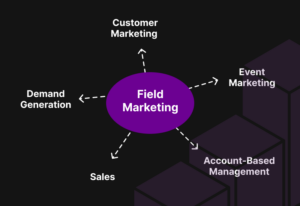It’s easy to get caught up in the latest online marketing trends and forget about the importance of connecting with customers in the real world. However, field marketing – the practice of taking your brand’s message and products directly to your target audience through events, experiences, and personalized interactions – offers a unique opportunity to build lasting relationships, drive engagement, and ultimately, boost revenue. When done correctly, field marketing can be a powerful tool in marketing, allowing you to break through the noise, create emotional connections, and generate tangible results. In this post, we’ll delve into the strategies, tactics, and success stories of companies that have successfully harnessed the power of field marketing, and provide actionable insights to help you do the same.

What is field marketing?
Field marketing is a dynamic branch of marketing that focuses on building brand awareness, customer relationships, and lead generation through direct, face-to-face interactions in the physical world. It’s about getting boots on the ground and creating a personal connection with your target audience.
Key strategies in field marketing
- Targeted audience: Successful field marketing hinges on a deep understanding of your target audience. Who are you trying to reach? What are their needs and pain points? Tailoring your approach to resonate with specific demographics is crucial.
- Strategic partnerships: Collaborating with complementary businesses can expand your reach and tap into new customer segments.
- Experiential marketing: Creating immersive experiences that allow potential customers to interact with your product or service firsthand is a powerful way to leave a lasting impression.
- Data-driven decisions: Track and measure the results of your field marketing efforts. Use data to identify what’s working and what’s not, and continuously refine your approach.
- Integration with digital marketing: Field marketing and digital marketing go hand-in-hand. Leverage social media, email marketing, and content marketing to amplify your field marketing efforts and create a cohesive brand experience.
Common types of field marketing activities
| Field marketing activity | Description |
| Trade shows & events | Industry trade shows and conferences offer a prime opportunity to showcase your product or service to a targeted audience. |
| Product demonstrations & in-store promotions | Live demonstrations allow potential customers to experience your product firsthand and address any questions they may have. In-store promotions can boost sales and brand awareness at the point of purchase. |
| Public relations & media events | Building relationships with media outlets can generate valuable press coverage and brand recognition. |
| Guerilla marketing | Unconventional and creative marketing tactics can create a buzz and generate excitement around your brand. |
| Field sampling & product giveaways | Providing potential customers with a free sample of your product is a great way to pique their interest and generate leads. |
| Field audits & retail execution | Monitoring retail locations to ensure product availability, proper merchandising, and compliance with brand guidelines is an important aspect of field marketing. |
The tangible benefits of field marketing
- Stronger brand awareness: Face-to-face interactions allow you to create a more personal connection with potential customers and build brand loyalty.
- Qualified lead generation: Field marketing activities can effectively target and capture high-quality leads that are more likely to convert into sales.
- Valuable customer insights: Direct interaction with customers provides valuable insights into their needs, preferences, and buying habits.
- Enhanced brand advocacy: Positive customer experiences can turn them into brand advocates who spread positive word-of-mouth.
- Measurable results: Field marketing campaigns can be tracked and measured, allowing you to assess their effectiveness and ROI.
Tactics for maximizing field marketing ROI
When it comes to maximizing field marketing ROI, it’s all about precision and execution. One of the most effective tactics is to focus on targeted, high-impact events that align with your sales strategy. This could include hosting exclusive product demos, sponsoring industry conferences, or even creating pop-up experiences that generate buzz and drive engagement. Another key tactic is to leverage technology to amplify your field marketing efforts, such as using data analytics to track lead generation, social media to amplify your message, and mobile apps to streamline event logistics. Additionally, building strategic partnerships with influencers, thought leaders, and other industry players can help extend your reach and credibility.
Real-life examples of field marketing success
The proof is in the pudding, and when it comes to field marketing, there’s no shortage of real-life examples that showcase its effectiveness. From sampling campaigns that drive product trials to event activations that generate buzz, field marketing has been instrumental in driving tangible results for brands across various industries. Consider the example of a popular beverage company that launched a sampling campaign at music festivals, resulting in a 25% increase in sales among the target demographic. Or, think about the fashion brand that created a pop-up shop in a trendy neighborhood, generating a 50% increase in brand awareness and a 20% increase in sales. These examples demonstrate the power of field marketing to connect with customers, build brand loyalty, and drive revenue.
Measuring the impact of field marketing
Measuring the impact of field marketing is a crucial step in understanding the effectiveness of your strategies and making data-driven decisions to optimize your efforts. But, it can be a daunting task, especially when dealing with multiple events, campaigns, and sales teams. That’s why it’s essential to have the right tools and metrics in place to track and analyze your field marketing efforts. From lead generation and conversion rates to event ROI and customer satisfaction, there are a multitude of key performance indicators (KPIs) to monitor and measure. Leveraging on the cutting-edge technologies such as marketing automation platforms, CRM systems, and data analytics tools, you can gain a deeper understanding of your field marketing initiatives and make adjustments to drive greater ROI and revenue growth. Additionally, using metrics such as cost per lead, cost per acquisition, and sales cycle length can help you identify areas of improvement and allocate resources more efficiently.
In conclusion, field marketing is a powerful tool that can drive real results for your business. The strategies and tactics outlined in this post creates a field marketing program that truly resonates with your target audience and sets your brand apart from the competition. Whether you’re looking to increase brand awareness, generate leads, or drive sales, field marketing offers a unique opportunity to connect with customers in a meaningful way. By putting the right people, processes, and technology in place, you can unlock the full potential of field marketing and achieve tangible results that drive real business growth. So, don’t just talk about your brand – bring it to life through field marketing and watch your business thrive.

